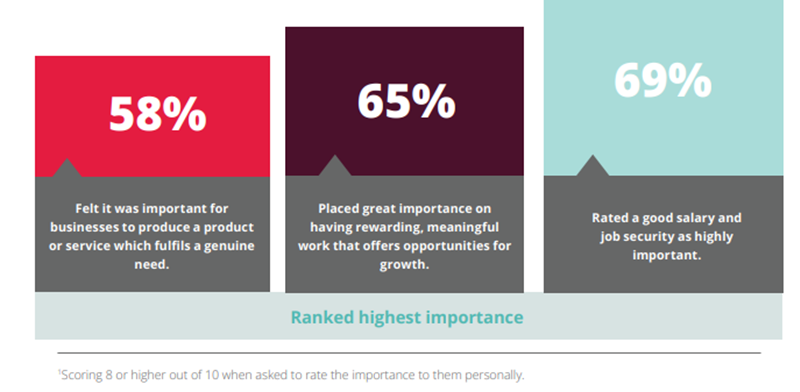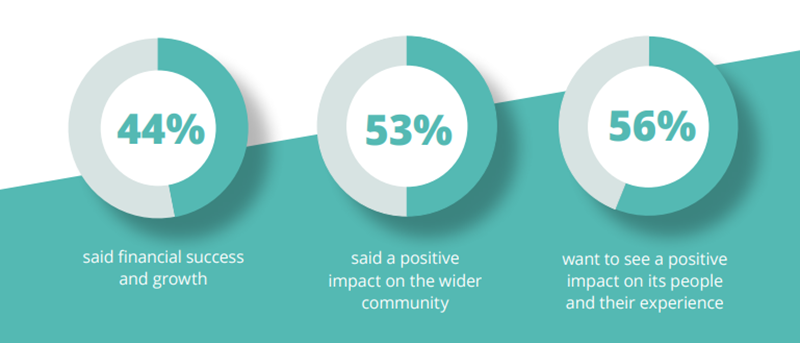More than money makes the world go round for Australian employees (Latest Research)
What do people want from their organisations? What makes a good organisation? And what makes an organisation good? It’s no surprise to find salary and job security at the top of the list. These elements of a job remain absolutely core to an employee’s perception of their organisation, and they are particularly important in the current economic climate.
Our latest research, Powering Profits and Prosperity, was carried out during a time of global volatility: economic conditions began to tighten, the war in Ukraine affected commodity and utility prices, and the cost of living became a major political issue in Australia.

Through this research we sought to establish if there was a way in which Australian organisations could better deliver on both profits and long-term prosperity. While economic factors understandably remain top of employees’ concerns, societal and psychological factors are also important considerations for working Australians, across every generation.
However, that’s not to say people are only motivated by their own self-interest.
Our research shows a more nuanced picture. One where psychological and social factors are just as important, if not more so in some cases as economic ones; and where people want to work for organisations that have a wider social impact.
There is more to life than money
Our research shows that factors labelled as ‘employee experience’ are vital to most people. However, it’s equally clear that financial remuneration is not the only thing people look for. There are a diverse range of concerns at play, including psychological, social and environmental considerations.
More than two-thirds (69%) of respondents rated ‘a good salary and job security as highly important’ - yet we found that the nature of the work and how organisations go about it was almost as important as the paycheck.
A similar proportion of respondents (65%) placed great importance on ‘having rewarding, meaningful work that offers opportunities for growth’. On a related note, more than half of respondents (58%) felt it was important for businesses to ‘produce a product or service which fulfils a genuine need,’ reiterating the close connection between the economic and psychological value of helping customers.
The way people work is also seen as important, with more respondents seeking to work with more autonomy (39%) than being subject to rigid processes and controls (23%).

Industry matters
Respondents from education and healthcare, are more likely to prioritise psychological and societal factors than they do economic ones. They are also more likely to want to work in a more autonomous model than they do currently (47% vs 32%). Those in professional services, by comparison, prioritise economic factors far above everything else. Three-quarters (75%) rated ‘a good salary and job security’ as the most important factor, with a clear 14% gap to the second most important consideration, ‘a fair and transparent employment process, providing opportunities for all’
People want organisations to have a positive social impact
Our research also enabled us to evaluate importance in terms of theme (economic or societal for example) and by affected audience/stakeholders. While respondents’ top three factors were all related to the employee experience, more than half (53%) rated ‘investment in education, training and skills to the benefit of the community’ as very important to them personally. The same proportion (53%) also felt it was important organisations should help to ‘raise living standards in the local community’. Respondents value diversity in the workplace, both in terms of people and thinking. It’s no surprise that ‘fair and transparent employment processes, providing opportunities for all,’ were perceived as highly important by a large majority (61%). It’s especially pleasing to see that people want to ensure their organisations are making positive contributions to society.
An organisation’s purpose should go beyond the bottom line
In line with the prominence of social impact, it’s fair to say that most businesses were founded on a central purpose, such as serving a community or a set of customers. And to an extent this remains true. Yet, some organisations risk losing sight of this purpose as they chase growth at all costs.
“Wall Street and the capitalist culture celebrate—and demand—growth. Indeed, slow growth is regarded as something between a disease and a moral failing,” Fisher, Gaur, and Kleinberger, Curing the Addiction to Growth
However, according to our research, most people disagree with the Wall Street worldview. In fact, they say organisations should emphasise factors other than growth. Less than half of respondents (44%) strongly agreed that financial success and growth should exist in, or form part of, an organisation’s purpose. More people want to see organisations prioritise a positive impact on their people and their experience (56%) and a positive impact on the wider community (53%).

Of course, without revenue, it’s impossible to offer job security or rewarding work, invest in communities or raise living standards. Yet is the purpose of generating revenue simply to make more, or to do good while doing well? Organisations need to remember why they exist and ensure that they remain true to their purpose. People want profits and prosperity.
Download the full Powering Profits and Prosperity report, or explore more on the Access Research Hub.










